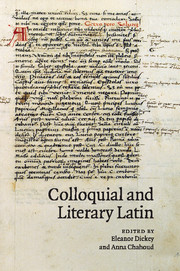Book contents
- Frontmatter
- Contents
- List of contributors
- Acknowledgements
- Foreword (David Langslow)
- PART I THEORETICAL FRAMEWORK
- PART II EARLY LATIN
- 6 Possessive pronouns in Plautus
- 7 Greeting and farewell expressions as evidence for colloquial language: between literary and epigraphical texts
- 8 Colloquial and literary language in early Roman tragedy
- 9 The fragments of Cato's Origines
- PART III CLASSICAL LATIN
- PART IV EARLY PRINCIPATE
- PART V LATE LATIN
- Abbreviations
- References
- Subject index
- Index verborum
- Index locorum
9 - The fragments of Cato's Origines
Published online by Cambridge University Press: 04 April 2011
- Frontmatter
- Contents
- List of contributors
- Acknowledgements
- Foreword (David Langslow)
- PART I THEORETICAL FRAMEWORK
- PART II EARLY LATIN
- 6 Possessive pronouns in Plautus
- 7 Greeting and farewell expressions as evidence for colloquial language: between literary and epigraphical texts
- 8 Colloquial and literary language in early Roman tragedy
- 9 The fragments of Cato's Origines
- PART III CLASSICAL LATIN
- PART IV EARLY PRINCIPATE
- PART V LATE LATIN
- Abbreviations
- References
- Subject index
- Index verborum
- Index locorum
Summary
Cato's Origines marked the beginning of Latin historiography, as earlier authors, beginning with Fabius Pictor, had written in Greek. It was composed in the latter part of his long life (234–149 bc) and consisted of seven books, of which the first three dealt with the foundation of Rome, the regal period and the origins of the cities of Italy (hence the title), while the remaining four contained an account of Roman history from the First Punic War to 149. He included in the Origines (something unique in ancient historiography) at least two of his speeches, one, delivered in 167, arguing in the Senate against declaring war on Rhodes (95), the other, delivered shortly before his death, supporting a bill to set up a special court to try Ser. Sulpicius Galba for his treatment of the Lusitani (108–9); the remaining fragments of his speeches (there are 254 in Malcovati) are not considered here.
Cato wanted to write impressively, and to that end looked for appropriate vocabulary and stylistic devices wherever he could find them. He took words from poetry and he neologised (see Briscoe 2005: 60), and, in principle, there is no reason why he should not, on occasion, have made use of features derived from the spoken language. To identify such elements, however, is very difficult: the only substantial texts earlier than Cato are the plays of Plautus, which certainly contain much that belongs to the spoken language, but also elements which are high-register.
- Type
- Chapter
- Information
- Colloquial and Literary Latin , pp. 154 - 160Publisher: Cambridge University PressPrint publication year: 2010



